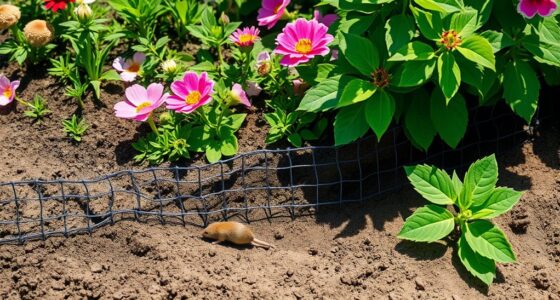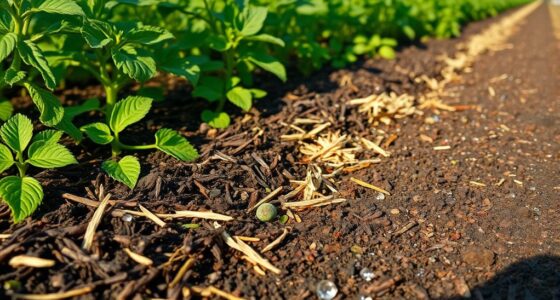To optimize soil health and boost plant immunity, focus on nurturing beneficial soil microorganisms by adding organic matter, compost, and cover crops. Balance essential nutrients through natural sources and regular soil tests, while minimizing chemical inputs to protect soil biodiversity. Use composting, mulching, and proper crop rotation to improve soil structure and prevent erosion. As your soil becomes healthier, plant resilience naturally increases—continue exploring how these practices work together to create stronger, disease-resistant plants.
Key Takeaways
- Incorporate organic matter, cover crops, and crop rotation to improve soil structure, fertility, and microbial diversity.
- Manage soil pH and organic matter levels to promote a healthy, resilient soil ecosystem that supports plant immunity.
- Minimize chemical inputs by using compost, mulches, and organic amendments to enhance beneficial microbes and soil health.
- Regularly test and monitor soil conditions to maintain optimal nutrient balance and prevent erosion or compaction.
- Support soil microbial activity through composting, mulching, and reduced chemical use to naturally boost plant immune responses.
Understanding the Importance of Soil Microorganisms
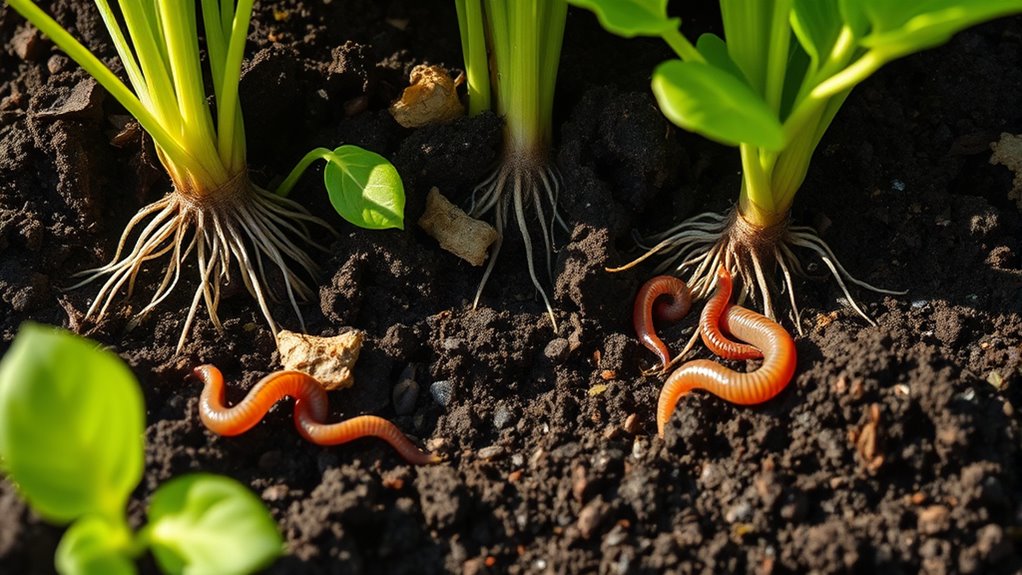
Soil microorganisms play a vital role in maintaining plant health and overall soil vitality. They form complex interactions within the soil microbiome, influencing nutrient cycling and disease suppression. One key aspect is mycorrhizal relationships, where fungi connect with plant roots, improving water and nutrient uptake, especially phosphorus. These symbiotic partnerships enhance plant resilience against pests and diseases, directly supporting immunity. Understanding soil microbiome dynamics helps you recognize how diverse microorganisms collaborate to create a balanced environment. When these microbes thrive, they regulate soil conditions, suppress pathogens, and foster healthy root systems. By nurturing these microbial communities, you set the foundation for stronger, more resistant plants. This knowledge underscores the importance of maintaining a vibrant soil ecosystem to boost plant immunity naturally.
Incorporating Organic Matter for Soil Fertility
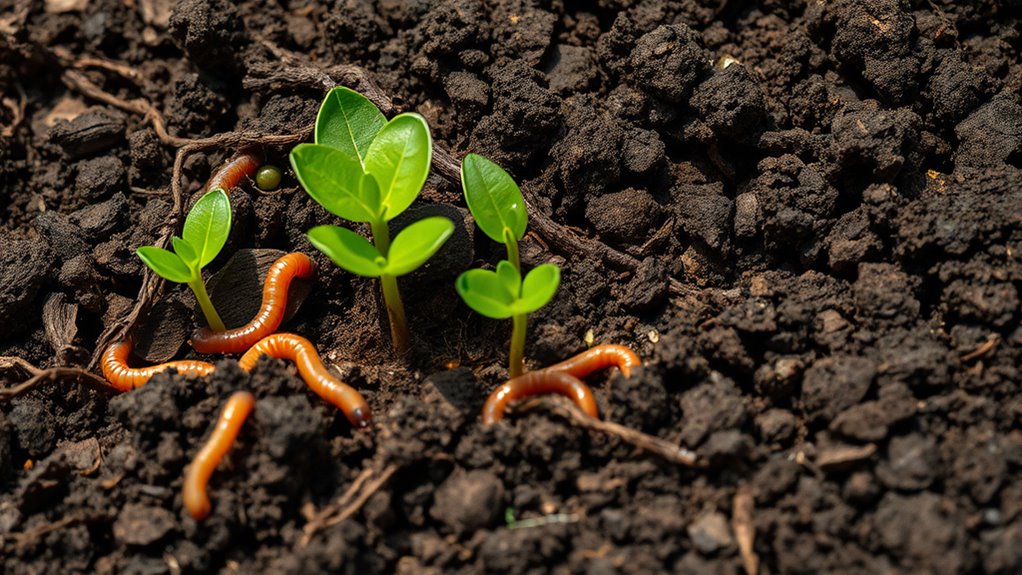
Incorporating organic matter into your soil is one of the most effective ways to enhance fertility and support healthy plant growth. Soil organic matter improves structure, water retention, and nutrient availability. To achieve this, regularly add compost amendments, which are rich in essential nutrients and beneficial microorganisms. These composts help increase soil organic matter, making it more fertile and resilient. As the organic matter decomposes, it releases nutrients slowly, providing a steady supply for your plants. Additionally, organic matter fosters a thriving soil ecosystem, encouraging beneficial microorganisms that help suppress diseases and boost plant immunity. Consistent incorporation of compost amendments not only improves soil health but also creates an environment where plants can grow stronger, healthier, and more resistant to pests and diseases. Incorporating a diverse range of organic materials can further enhance this process and promote soil microbial diversity.
Balancing Essential Nutrients for Optimal Plant Growth
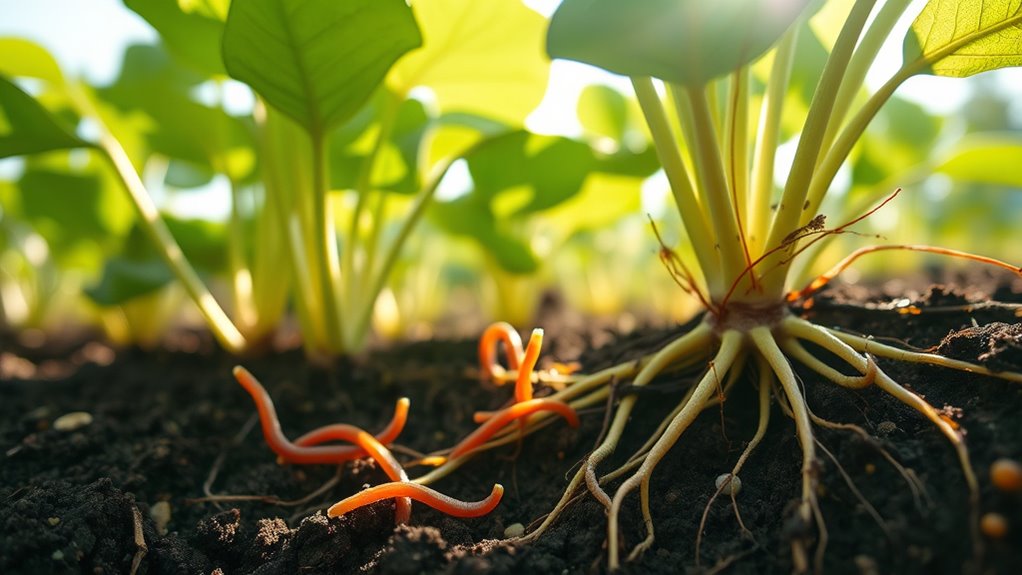
To guarantee your plants thrive, maintaining a proper balance of essential nutrients is crucial. Nutrient imbalance can hinder growth, weaken immunity, and reduce yields. Too much nitrogen, for example, can cause excessive foliage but poor root development, while deficiencies in phosphorus or potassium limit flowering and fruiting. Soil contamination from pollutants or overuse of chemical fertilizers can also disrupt nutrient availability, leading to toxicity or deficiencies. Regular soil testing helps you identify imbalances and prevent harmful buildup. Adjusting fertilization based on these results ensures your plants receive the right nutrients in appropriate amounts. Additionally, understanding the contrast ratio helps in assessing how well your soil conditions support healthy plant development. By balancing essential nutrients, you promote healthy growth, strengthen immunity, and create a resilient soil environment that supports sustainable plant development.
Reducing Chemical Inputs to Support Soil Biodiversity
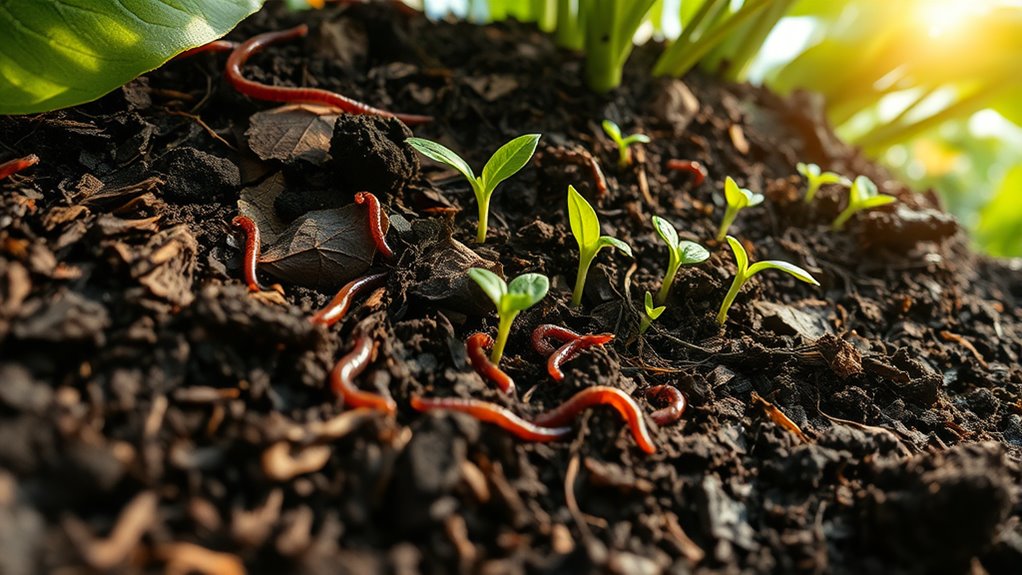
Reducing chemical inputs helps protect and enhance soil biodiversity, which is essential for healthy plant immunity. You can minimize synthetic fertilizers and limit pesticide use to create a more balanced soil ecosystem. Promoting organic amendments further supports beneficial microorganisms and improves soil resilience. Embracing creative practice in sustainable farming can inspire innovative solutions to soil health challenges.
Minimize Synthetic Fertilizers
Minimizing synthetic fertilizers is essential for supporting soil biodiversity and enhancing plant immunity. Overusing these chemicals can lead to synthetic fertilizer drawbacks, such as disrupting natural nutrient cycles and harming beneficial microbes. Additionally, soil chemical residues from synthetic fertilizers can accumulate, affecting soil health and plant resilience. To reduce reliance on these inputs, you should: 1. Use organic amendments like compost or manure to naturally enrich soil. 2. Implement crop rotation to improve nutrient availability. 3. Incorporate cover crops that fix nitrogen and add organic matter. 4. Monitor soil health regularly to tailor fertilization needs precisely. Soil health is a critical component that benefits from reducing chemical inputs and fostering natural microbial activity.
Limit Pesticide Use
Have you considered how excessive pesticide use can harm the very soil organisms that support plant health? Pesticides can kill beneficial insects, microbes, and fungi essential for nutrient cycling and disease suppression. Instead of relying heavily on chemical controls, explore pesticide alternatives like biological agents or natural repellents. Implementing integrated pest management (IPM) allows you to target pests effectively while minimizing chemical inputs. IPM combines monitoring, cultural practices, and biological controls, reducing the need for pesticides altogether. By limiting pesticide use, you protect soil biodiversity, which in turn enhances plant immunity and resilience. Supporting healthy soil ecosystems ultimately leads to healthier plants and a more sustainable farming system. Incorporating soil microbiome management practices can further enhance soil health and plant immunity.
Promote Organic Amendments
By shifting away from chemical inputs, you can actively enhance soil biodiversity through the use of organic amendments. Incorporating materials like compost tea and organic mulches introduces beneficial microbes and nutrients that support soil life. To maximize these benefits, consider these steps:
- Apply compost tea regularly to boost microbial activity and nutrient availability.
- Use organic mulches such as straw or wood chips to protect soil, retain moisture, and foster microbial diversity.
- Incorporate compost or well-rotted manure to enrich soil organic matter and promote beneficial organisms.
- Avoid synthetic fertilizers, replacing them with organic amendments to encourage a balanced, resilient soil ecosystem.
- Pay attention to recognizing patterns in soil health indicators, which can guide your amendments for optimal results.
These practices create a thriving environment for soil microbes, which in turn strengthens plant immunity and reduces reliance on chemical inputs.
Using Cover Crops to Enhance Soil Structure and Health
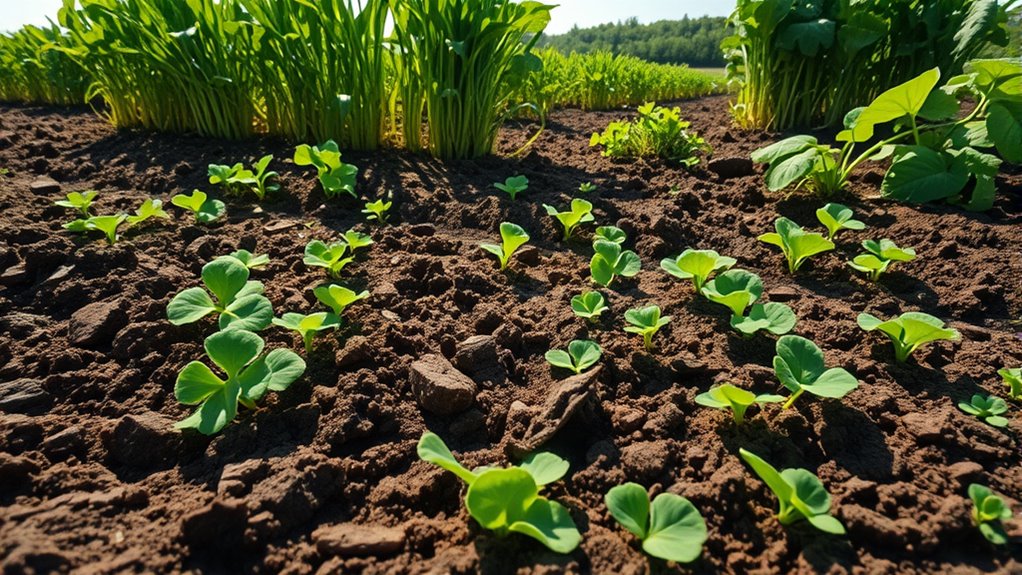
Planting cover crops can boost your soil’s fertility and structure naturally. They supply essential nutrients, reducing your need for chemical fertilizers. By choosing the right cover crops, you support healthier soil and stronger plant immunity.
Improving Soil Fertility
Using cover crops is a highly effective way to boost soil fertility and improve soil structure. They enhance organic matter decomposition, enriching the soil naturally. To maximize benefits, focus on these key practices:
- Select cover crops suited to your soil’s pH, aiding in soil pH management.
- Incorporate legumes to fix nitrogen, boosting nutrient availability.
- Use deep-rooted plants to break up compacted soil and improve aeration.
- Terminate cover crops at the right time to promote organic matter decomposition, increasing nutrient content.
These strategies help create a balanced environment that supports healthy plant growth and immunity. By managing soil pH and encouraging organic matter breakdown, you set a strong foundation for resilient, nutrient-rich soil.
Supplying Natural Nutrients
Cover crops not only improve soil structure but also serve as an essential source of natural nutrients that support healthy plant growth. They release nutrients from natural mineral sources, enriching the soil naturally. Incorporating organic foliar feeds derived from cover crop extracts can further boost nutrient availability directly to plants. These feeds supply crucial micronutrients and enhance nutrient uptake, strengthening plant immunity. Using cover crops to provide these natural nutrients reduces reliance on synthetic fertilizers and promotes a balanced soil ecosystem. As a result, your plants become more resilient against pests and diseases. Additionally, integrating cover crops into your soil management can forsale 100 improve overall soil fertility and microbial activity, fostering a healthier, more productive environment that naturally enhances plant immunity and overall growth.
Employing Crop Rotation and Diversification Strategies

Implementing crop rotation and diversification strategies plays a crucial role in enhancing soil health and boosting plant immunity. By carefully choosing cover crops, you improve soil structure, suppress weeds, and increase nutrient cycling. Incorporating crop diversity reduces the risk of disease buildup and pest infestations. To maximize benefits, consider these steps:
Implement crop rotation and diversity to improve soil health and plant immunity naturally.
- Select cover crops that fix nitrogen and improve soil organic matter.
- Rotate crops with different root structures to prevent soil depletion.
- Mix plant varieties to promote beneficial microbial activity.
- Vary planting times to disrupt pest and pathogen life cycles.
- Applying principles of the Law of Attraction can help in aligning your farming goals with practices that promote resilience and growth.
These strategies create a resilient, balanced ecosystem that supports healthy plants and stronger immunity. Proper crop rotation and diversification strengthen soil vitality, leading to healthier yields over time.
Implementing Composting and Mulching Techniques
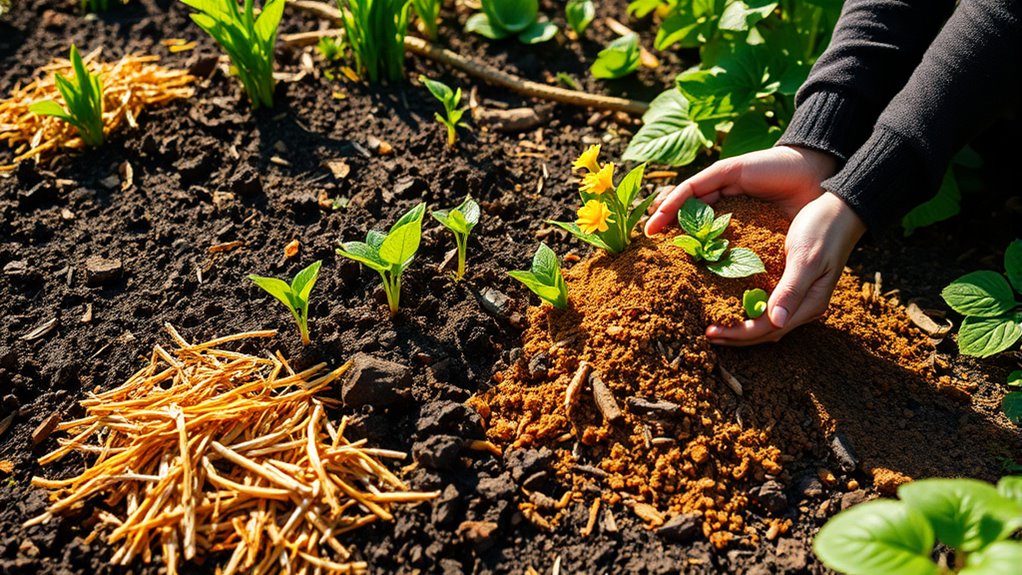
By adding compost and mulch to your soil, you can substantially boost its fertility and structure. Composting techniques involve recycling organic waste like vegetable scraps and yard debris into nutrient-rich compost, which improves soil texture and provides essential nutrients. Use proper layering and aeration to assure efficient composting. Mulching methods, such as applying straw, wood chips, or shredded leaves, help retain soil moisture, suppress weeds, and regulate temperature. Consistent mulching prevents erosion and adds organic matter over time. Both composting and mulching create a healthier soil environment, encouraging beneficial microbes that enhance plant immunity. Incorporating remote hackathon opportunities into your gardening community initiatives can also foster innovative solutions for sustainable practices. Incorporate these techniques regularly to maintain soil vitality and support resilient, thriving plants. Proper implementation of composting and mulching methods is key to fostering robust plant growth and disease resistance.
Monitoring Soil Health With Simple Testing Methods
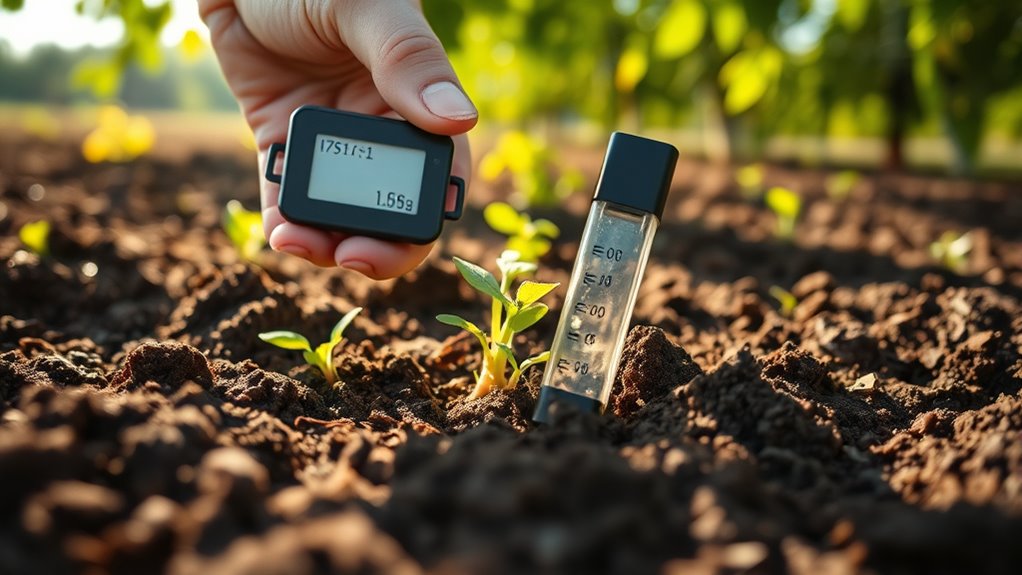
Monitoring your soil’s health doesn’t have to be complicated; simple testing methods can give you valuable insights into its condition. Start with basic soil testing to assess key factors. Here are four steps to help you get accurate results:
- Collect a soil sample from different spots in your garden.
- Use a home testing kit for pH and nutrient analysis.
- Send samples to a lab for detailed nutrient analysis if needed.
- Record and compare results over time to track changes.
These straightforward methods let you identify deficiencies or imbalances quickly. Regular soil testing helps you adjust fertilization and amend soil health, boosting plant immunity naturally. By understanding your soil’s nutrient profile, you can make informed decisions that promote healthier, more resilient plants. Incorporating knowledge about soil health and nutrient balance can further enhance your garden’s overall vitality.
Avoiding Soil Compaction and Erosion

Soil compaction and erosion can considerably reduce your garden’s productivity and threaten plant health if left unchecked. To prevent soil compaction, avoid walking on wet soil and use designated pathways to distribute weight evenly. Incorporate soil compaction prevention techniques like adding organic matter, which improves soil structure and reduces compaction risks. For erosion control strategies, plant cover crops or mulch to shield the soil surface from wind and water runoff. Establishing contour rows or terracing on slopes also helps slow water flow and prevents soil loss. Maintaining healthy, loose soil promotes better root growth and nutrient absorption, boosting plant immunity. Regularly monitoring soil condition and applying these erosion control strategies will help sustain soil vibrancy and protect your garden’s productivity.
Promoting Beneficial Insects and Microbes in the Soil
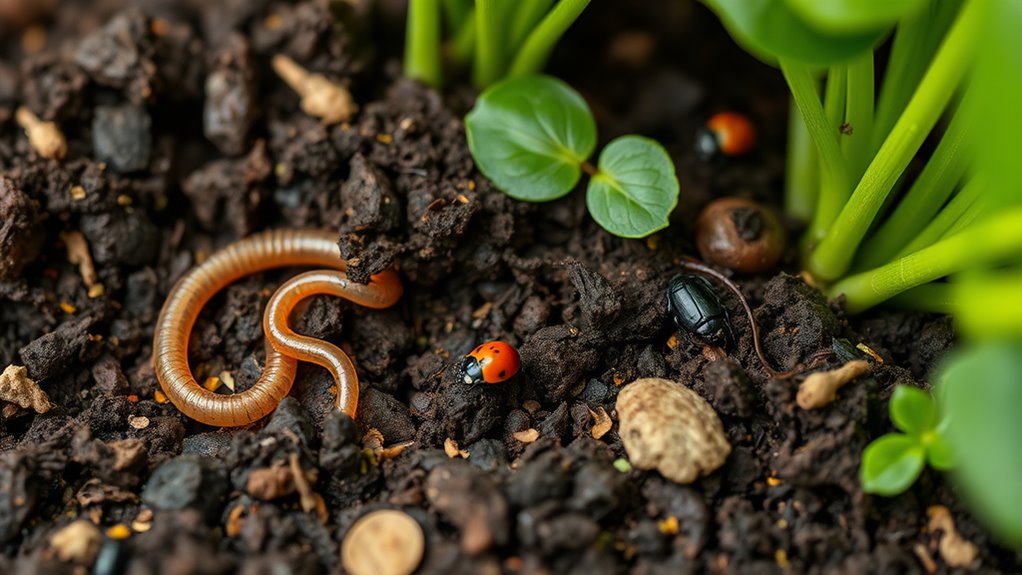
You can boost your soil health by attracting beneficial insects that naturally control pests and improve pollination. Supporting diverse soil microbes helps break down organic matter and enhances nutrient availability for your plants. By creating a welcoming environment, you encourage a thriving ecosystem beneath the surface that strengthens plant immunity.
Attracting Beneficial Insects
Have you ever wondered how beneficial insects naturally protect your plants from pests? You can attract these helpful allies by creating a welcoming environment. Start with:
- Planting diverse, native flowers to provide nectar and pollen, encouraging pest predation.
- Leaving some bare patches or mulch to offer shelter and habitat creation for beneficial insects.
- Avoiding chemical pesticides that harm these insects, allowing populations to thrive.
- Providing water sources, like shallow dishes or moist soil, to support their survival.
Supporting Soil Microbial Diversity
Creating a healthy garden environment that attracts beneficial insects also promotes a diverse and vibrant microbial community beneath the surface. Supporting soil microbial diversity starts with avoiding chemical pesticides and fertilizers that harm the soil microbiome. Instead, incorporate organic matter like compost and cover crops to nourish beneficial microbes. A rich microbial diversity enhances nutrient cycling, suppresses diseases, and boosts plant immunity. You can also introduce beneficial microbes through soil inoculants to strengthen the soil microbiome. Maintaining minimal tillage helps preserve microbial habitats and encourages diverse microbial populations. By fostering this microbial diversity, you create a resilient soil ecosystem that naturally supports plant health. A thriving soil microbiome is key to long-term soil fertility and stronger, healthier plants.
Frequently Asked Questions
How Do Soil Ph Levels Affect Plant Immunity?
Soil pH levels profoundly influence plant immunity by affecting microbial diversity and nutrient availability. When you perform pH adjustment, you create a more balanced environment that supports beneficial microbes, which help protect plants from diseases. A proper pH encourages microbial diversity, boosting natural defenses. You’ll want to regularly test your soil and adjust pH accordingly, fostering a healthier, more resilient plant system that naturally fights off pathogens.
Can Soil Health Influence Crop Yield Consistency?
You can see soil health greatly influences crop yield consistency. Healthy soil supports better root growth and nutrient availability, making crops more resilient. Incorporate cover crop benefits like fixing nitrogen and reducing erosion, and adopt crop rotation strategies to prevent soil depletion. These practices improve soil structure and microbial activity, leading to more reliable yields season after season. By focusing on soil health, you guarantee a stable, productive harvest every time.
What Role Do Soil Fungi Play in Disease Suppression?
Soil fungi, especially mycorrhizal networks, play a essential role in disease suppression. You benefit from these networks as they enhance nutrient uptake and strengthen plant defenses. Fungal antagonists actively combat soil pathogens, reducing disease spread. By fostering healthy soil fungi, you establish a natural barrier against diseases, promoting healthier plants and better yields. This symbiotic relationship is critical for maintaining resilient, disease-resistant crops in your soil ecosystem.
How Does Soil Moisture Impact Microbial Activity?
Imagine gentle soil moisture management as a delicate dance that influences microbial activity dynamics beneath your feet. When you maintain ideal soil moisture levels, you foster a thriving microbial community that supports healthy plant growth. Too much moisture can drown beneficial microbes, while too little hampers their activity. By carefully balancing soil moisture, you ensure a vibrant microbial ecosystem, strengthening plant defenses naturally and promoting resilient, vigorous growth.
Are There Natural Methods to Boost Soil Beneficial Bacteria?
You can naturally boost soil beneficial bacteria by using compost tea, which introduces helpful microbes directly into your soil. Cover cropping also enhances bacterial growth by providing organic matter and maintaining soil moisture. Both methods support a thriving microbial community, improving soil health and plant immunity. Incorporate compost tea regularly and plant cover crops like clover or vetch to strengthen your soil’s natural defenses effectively.
Conclusion
Think of your soil as the foundation of a thriving fortress. By nurturing its unseen allies—microbes, organic matter, and beneficial insects—you strengthen your plants’ immune defenses. Every step you take, from composting to cover crops, is like reinforcing walls against pests and disease. When you tend to this essential foundation with care, you’re not just growing plants—you’re cultivating resilience that shields your garden’s future. Protect your soil, and watch your plants flourish like an unbreakable fortress.



